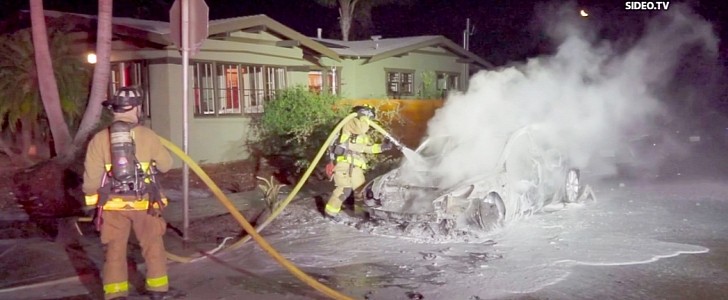Automakers usually offer eight years or more of warranty in battery packs to give buyers more confidence when buying an electric car. For a longer time, the most expensive part of the vehicle will allegedly not be a concern. But what if it burns down the automobile and anything around it? The Insurance Association of China proposed giving “new energy vehicles” an additional coverage compared to combustion-engined vehicles: against spontaneous fires.
The association did not state why it has proposed that, but what comes to mind are recent issues such as the one with the Chevrolet Bolt EV and the Hyundai Kona Electric. Tesla also has some episodes that the company did not clarify as it should, such as the ones that seem to have prompted it to make voltage-capping updates recently.
EV advocates claim that electric cars do not catch fire as often as those with combustion engines, which may even be true. The problem is that spontaneous fires originating from lithium-ion battery packs are difficult to extinguish and much more potent than those involving regular cars.
If an EV happens to have a thermal runaway episode, the fire will affect everything close to it. Hyundai Kona Electrics were forbidden to use some public chargers in South Korea. In the U.S., the fires have destroyed the cars and the garages in which they were parked. Yogi Vindum lost two Tesla Model S units he owned and had damages in his property that amounted to more than $1 million. Thankfully, he had good insurance coverage.
When a battery pack spontaneously combusts, proving that the issue was with the car can be expensive. It demands courts, forensic inspections, lawyers, and time. Most consumers are not willing to spend money or any other resource with that. That could be a good reason for the Chinese association to suggest this new coverage.
Until the technology is proven, thermal runaways are not a concern, and automakers are more willing to be transparent and upfront to customers, the proposition could give people willing to adopt electric cars the necessary peace of mind to do so.
EV advocates claim that electric cars do not catch fire as often as those with combustion engines, which may even be true. The problem is that spontaneous fires originating from lithium-ion battery packs are difficult to extinguish and much more potent than those involving regular cars.
If an EV happens to have a thermal runaway episode, the fire will affect everything close to it. Hyundai Kona Electrics were forbidden to use some public chargers in South Korea. In the U.S., the fires have destroyed the cars and the garages in which they were parked. Yogi Vindum lost two Tesla Model S units he owned and had damages in his property that amounted to more than $1 million. Thankfully, he had good insurance coverage.
When a battery pack spontaneously combusts, proving that the issue was with the car can be expensive. It demands courts, forensic inspections, lawyers, and time. Most consumers are not willing to spend money or any other resource with that. That could be a good reason for the Chinese association to suggest this new coverage.
Until the technology is proven, thermal runaways are not a concern, and automakers are more willing to be transparent and upfront to customers, the proposition could give people willing to adopt electric cars the necessary peace of mind to do so.





























